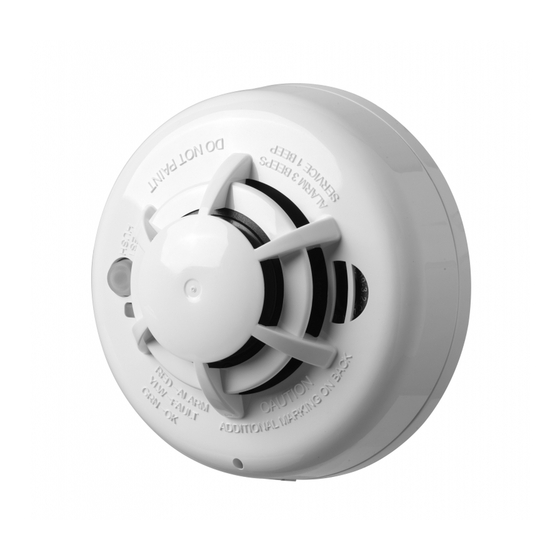DSC WS4936 Installation And Operating Instructions Manual - Page 6
Browse online or download pdf Installation And Operating Instructions Manual for Smoke Alarm DSC WS4936. DSC WS4936 6 pages. (433mhz) / (868mhz) series wireless smoke detector

Regulatory Information
Thisproduct hasbeen approved bythe California State Fire Marshal(CSFM) pur-
suant to section 13144.1 of the California Health and SafetyCode. See CSFM
Listing No. 7272-1273:125 for allowable valuesand/or conditionsfor use con-
cerning materialpresented in thisdocument. The approvalissubject to reex-
amination, revision and possible cancellation.
The smoke alarmWS4936 / WS4936EU / WS8936 hasa recommended service
life of 10 yearsunder normalconditionsof use. Please refer to the labelapplied to
the device indicating the recommended replacement year.
For servicing the unit or replacement batteriesplease callyour installation com-
panythat provided you with the alarmsystem.
NOTE: In Australia, the device shallnot be installed in locationswhere the normal
ambient temperature islower than 41°F (5°C) or higher than 113°F (45°C).
Thismanualshallbe used in conjunction with the Installation Manualof the alarm
controlpanel. Allthe instructionsspecified within that manualmust be observed.
FCC Compliance Statement
CAUTION: Changesor modificationsnot expresslyapproved byDSC could void
your authorityto use thisequipment.
Thisequipment generatesand usesradio frequencyenergyand if not installed
and used properly, in strict accordance with the manufacturer'sinstructions, may
cause interference to radio and television reception. It hasbeen type tested and
found to complywith the limitsfor ClassBdevice in accordance with the spe-
cificationsin Subpart "B" of Part 15 of FCC Rules, which are designed to provide
reasonable protection against such interference in anyresidentialinstallation.
However, there isno guarantee that interference willnot occur in a particular
installation. If thisequipment doescause interference to television or radio recep-
tion, which can be determined byturning the equipment off and on, the user is
encouraged to tryto correct the interference byone or more of the following
measures:
•Re-orient the receiving antenna
•Relocate the alarmcontrolwith respect to the receiver
•Move the alarmcontrolawayfromthe receiver
•Connect the alarmcontrolinto a different outlet so that alarmcontroland
receiverare on different circuits.
If necessary, the usershould consult the dealeroran experienced radi-
o/television technician foradditionalsuggestions. The usermayfind the following
booklet prepared bythe FCC helpful: "How to Identifyand Resolve Radi-
o/Television Interference Problems". Thisbooklet isavailable fromthe U.S.
Government Printing Office, Washington, D.C. 20402, Stock# 004-000-00345- 4.
Industry Canada Compliance Statement:
ThisClassBdigitalapparatusmeetsallrequirementsof the Canadian inter-
ference-causing equipment regulations.
Cet appareilnumérique de la Classe Brespecte touteslesexigencesde règle-
ment surle matérielbrouilleurdu Canada.
IC:160A-WS4936
The term"IC:"before the radio certification number onlysignifiesthat Industry
Canada technicalspecificationswere met.
1134-CPR-XXXX
DSC, Toronto, Canada
EN14604: 2005/AC:2008
Smoke Alarm Device
© 2015 Tyco Security Products. All Rights Reserved.
Tech Support: 1-800-387-3630 (Canada & U.S.)
or 905-760-3000 • www.dsc.com
This device complies with FCC Part
15 and IC License-exempt RSSs.
Operation is subject to the following
two conditions: (1) this device may
not cause interference, and (2) this
device must accept any
interference, including interference
that may cause undesired operation
of the device.
Le présent appareil est conforme
aux CNR d'Industrie Canada
applicables aux appareils radio
exempts de licence. L'exploitation
est autorisée aux deux conditions
suivantes : (1) l'appareil ne doit pas
produire de brouillage, et (2)
l'utilisateur de l'appareil doit
accepter tout brouillage
radioélectrique subi, même si le
brouillage est susceptible d'en
compromettre le fonctionnement.
6
